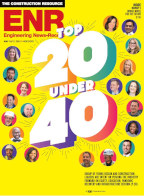Every couple of weeks someone publishes another article about the small number of minorities and women in technical fields. Leaders of firms in advanced industries—including architecture, engineering and construction—worry about the future shortage of young talent with science, technology, engineering and math (STEM) skills.
Are we doing enough to get the best players onto the construction playing field and drawing on the entire talent pool? I don't think so.
 |
| OZANNE |
There are a number of reasons why gaps exist between career seekers and employers in advanced industries and professional fields. Both career seekers and employers can take steps to close it.
Employers are constantly talking about the skills gap, with good reason.
Without basic skills in reading, writing, math and grammar and a working knowledge of Word and Excel, a person has little chance of successfully completing an application for employment—let alone getting and keeping a job. Diverse career seekers must be proficient in the use of the most current software and technologies applicable to their industries of choice. Many employers also look for skills in coding and graphic design.
Career pathway preparation has to start with an understanding of the culture of the business or organization that a job seeker is targeting. All successful teams and organizations have a well-established, achievement-centered culture. Young people must have a passion for success.
On the employee side, recreational drug use is commonplace for many young people, and the legalization of marijuana will make pot more accessible. Employers, however, will continue to test for drugs and disqualify applicants if they cannot pass a drug test, in many cases one that tests for 10 to 15 different substances. Another unfortunate reality is that many young people become entangled in the legal system, often for very minor drug-possession offenses. Many companies don't hire people with criminal backgrounds.
Then, there are intangible qualities, such as a great disposition, positive attitude and a humble yet self-confident demeanor. No employer wants a negative personality in the organization.
Race and ethnicity still are barriers, but they can be overcome. Take note, for example, of the tremendous success of Chinese- and Japanese-Americans who have ascended to the top of America's economic pyramid through exceptionally hard work, personal sacrifice, discipline and a strong sense of family.
High grades, strong test scores and industry-specific credentials will help to overcome the perception that minorities and women can't compete.
Employers have some work to do, too. If they truly seek America's top talent, designers and contractors should provide a corporate culture that welcomes capable people from all backgrounds. Paid internships help. Workforce programs—such as Jumpstart Pathways in Louisiana—are good models.
Unfortunately, for some people, the success of a minority or woman employee looks like the failure of a non-minority male.
Although this is a negative, regressive mind-set, it is a reality in some companies, labor organizations and trade associations. Any company that wants to diversify its staff must have diverse people in leadership positions.
Construction lags far behind other industries as far as hiring minorities and women, but that can change. Talented, low-income high school students are entering America's best colleges and universities. The paths to successful careers are there for smart, hard-working, economically and socially disadvantaged students.
While no single group is to blame for construction's current lack of diversity and inclusion, it is incumbent upon industry leaders to find ways to bring together the leaders and resources to open the career paths to all.
We can and must do much more to make our industry's workforce competitive and diverse.
Dominic L. Ozanne is CEO of Ozanne Construction Co., a design-build and construction management firm with offices in Cleveland and New Orleans. He can be reached at dozanne@ozanne.com.
If you have an idea for a column, please contact Viewpoint Editor Richard Korman at richard.korman@construction.com.


Post a comment to this article
Report Abusive Comment